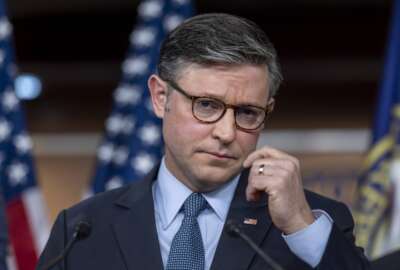DorobekInsider: BREAKING NEWS — Sens. Collins, McCaskill, Bennett introduce acquisition workforce bills
UPDATED with the text of the bills… Breaking news — Senators Susan Collins (R-ME), Claire McCaskill (D-MO), and Bob Bennett (R-UT) have just introduced...
UPDATED with the text of the bills…
Breaking news — Senators Susan Collins (R-ME), Claire McCaskill (D-MO), and Bob Bennett (R-UT) have just introduced two bills that seek to improve the federal acquisition workforce.
The Acquisition Workforce Improvement Act of 2009 would create a federal acquisition management fellows program to help mention a new generation of acquisition leaders with government-wide perspective, skills and experience. Read the text of the bill here.
The second bill is the Federal Acquisition Institute Improvement Act of 2009 and it would prompt a reorganization allowing the Federal Acquisition Institute to help fulfill its mission. Read the text of the bill here.
Here is the full release:
SENATORS COLLINS, McCASKILL, BENNETT INTRODUCE TWO BILLS TO BOLSTER THE FEDERAL ACQUISITION WORKFORCE
The bipartisan measures stress mentoring, career development, managementWASHINGTON, D.C. – Improving the federal acquisition workforce system through training and better management is the focus of two bills that were introduced Thursday by Senators Susan Collins, R-Me., Claire McCaskill, D-Mo., and Bob Bennett, R-Ut.
The first bill, “The Acquisition Workforce Improvement Act of 2009,” would create a federal acquisition management fellows program to help mentor a new generation of acquisition leaders with government-wide perspective, skills, and experience. It would combine both a Master’s degree-level academic curriculum with on-the-job training in multiple federal agencies. By partnering with leading universities that have specialized government acquisition programs, the government can attract top-caliber students who are interested in pursuing both academic advancement and public service.
The second bill, “The Federal Acquisition Institute Improvement Act of 2009,” would prompt reorganization, allowing the Federal Acquisition Institute (FAI) to fulfill its mission of aiding career development and maximizing the potential of federal acquisition workforce.
“The federal acquisition system is under tremendous stress,” said Senator Collins. “Between fiscal years 2000 and 2008, acquisition spending by the federal government expanded by 163 percent, from $205 billion to $539 billion. The rising costs of military operations, natural disasters, homeland security precautions, and other vital programs will drive those expenditures to even higher levels in the years ahead.”
This requires professionally trained and invested acquisition personnel, who can manage these huge expenditures while also guarding against the possibility of waste, fraud and abuse of taxpayer dollars. “This prodigious level of purchasing creates abundant opportunities for fraud, waste, and abuse. We have seen far too many outrageous failures in government contracting, such as unusable trailers for hurricane victims, shoddy construction of schools and clinics in Afghanistan, or the installation of showers in Iraq for our troops that pose electric-shock hazards. These and other failures demand strong steps to protect taxpayer dollars and deliver better acquisition outcomes.”
Said Senator McCaskill: “With the increases we’ve seen in government contracting, it is unacceptable that our acquisition workforce is falling behind in terms of training and resources they need to effectively oversee spending. If we want to improve the way the government spends money, we need more well-trained people on the front lines so that they can better prevent waste, fraud, and abuse by writing and carrying out good contracts. This will ensure that the taxpayers are getting the best bang for their buck.”
Added Senator Bennett: “Responsible federal contracting relies on careful, informed analysis by all components of the acquisition workforce. Workforce development is a pillar for strengthened acquisition practices and improved performance. Without a well trained and capable acquisition workforce, our federal contracting efforts will not improve.”
Senator Collins, a long-time advocate for stronger competition, accountability, and transparency in government contracting, said she recognizes and appreciates “the steps the Administration has taken recently to improve federal contracting. Many of these initiatives originated from legislation I co-authored with Senator Lieberman, ID-Conn., during the last Congress. But no matter how many laws we pass or OMB guidance documents are issued, the effectiveness of our federal acquisition system depends on a vital human component – the acquisition workforce.”
While contract spending has risen dramatically, the number of acquisition professionals who help plan, award, and oversee these contracts has been stagnant. And with roughly half of the current acquisition workforce eligible to retire over the next decade, the difficulties of strengthening that workforce will become increasingly acute. A well-trained and well-resourced acquisition workforce is critical to keeping pace with increased federal spending and much more complex procurements of services and goods.
The Obama Administration has identified acquisition workforce development as a pillar for improving acquisition practices and contract performance.
To make that goal a reality, the three Senators authored the two bills in order to deliver specific and concrete action to solve the problem. The Acquisition Workforce Improvement Act and the Federal Acquisition Institute Improvement Act are critically needed and both enjoy bipartisan support. The Senators urged their colleagues to support the measures.
Copyright © 2024 Federal News Network. All rights reserved. This website is not intended for users located within the European Economic Area.





